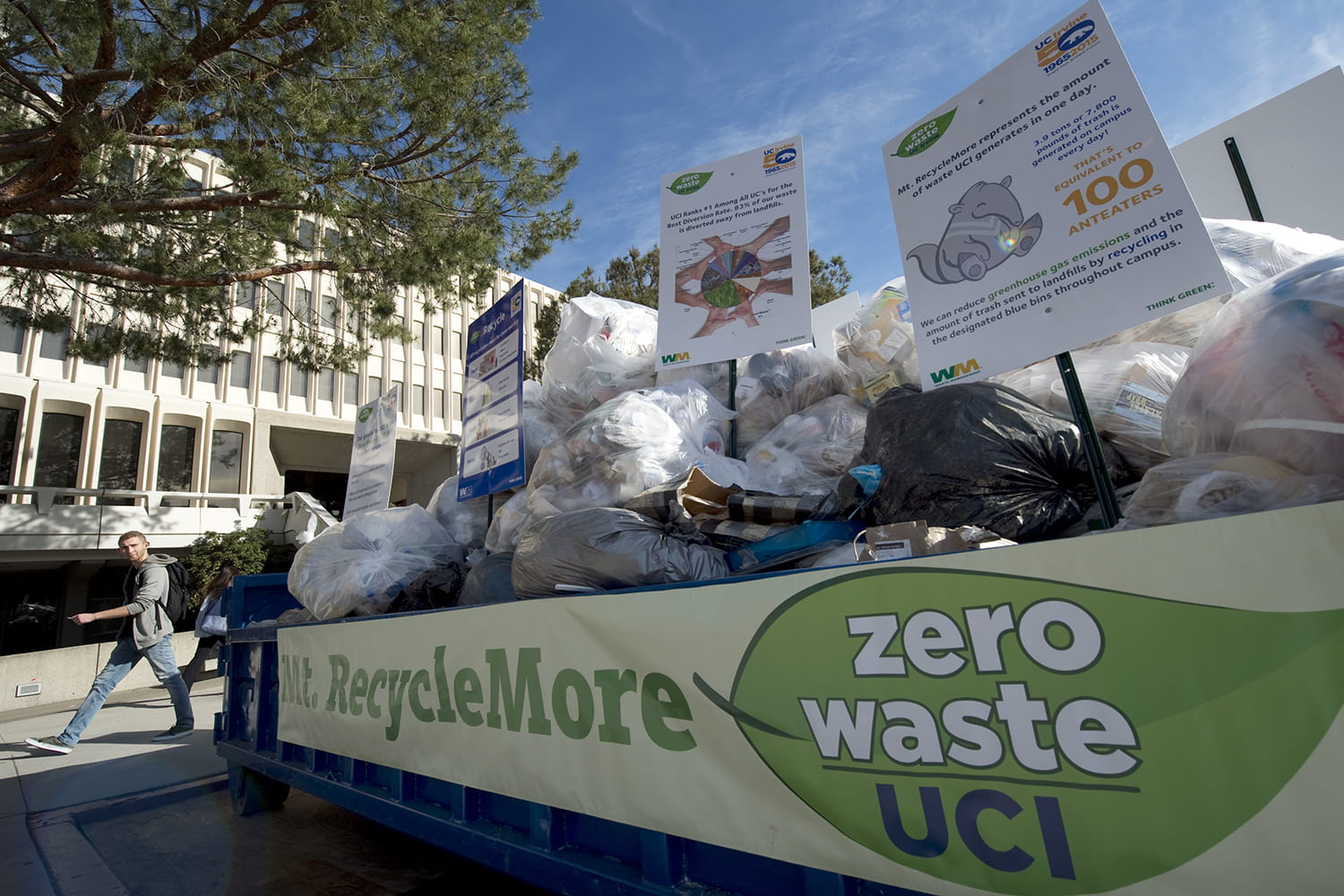Our daily discards
Eye-popping Earth Week exhibit shows how far campus is from zero-waste goal

Four tons, or 8,000 pounds, or enough trash to fill an 8-by-22-foot garbage bin is what the University of California, Irvine community sends to landfills every day. This Earth Week, the rubbish that normally vanishes so quickly will be on display in an innovative project called “Mt. RecycleMore.”
The brainchild of Facilities Management staff, a container filled with closed trash bags will be positioned near UCI’s flagpoles today as a visual reminder of what we toss daily. The exhibit is one of a number of events scheduled during Earth Week to celebrate environment-friendly, sustainable practices. The week culminates Friday with Earth Day.
“UCI has an enviable 83 percent waste diversion rate, which puts us well on our way to achieving our goal of being a zero-waste campus,” says Anne Krieghoff, recycling and sustainability program manager. “This display will enable people to see what the remaining 17 percent looks like and hopefully inspire them to participate more fully in campus recycling programs.”
The UC Office of the President has set ambitious sustainability goals, among them a mandate for zero waste – defined as 95 percent diversion from landfills – by 2020.
UCI still has room to improve when it comes to materials that staff and students dispose of in the bins labeled “landfill” at their desks, in dining areas, in classrooms and on pedestrian pathways, Krieghoff says.
“General trash and often items that could have been recycled are put in these bins,” she says. “People can minimize their waste by sorting those items that are clean and dry and placing them into a blue recycle bin.”
The benefits are many. Less landfill waste translates to reduced greenhouse gases and improved air quality. Recycled paper, glass and plastics are used to make new products.
“By recycling, we reduce the energy required to make these items from scratch by 90 percent,” Krieghoff says. “And another wonderful benefit is that new jobs are created both in the recycling process and in the manufacturing of new products from recycled materials.”
While “Mt. RecycleMore” serves as a reminder, Earth-friendly habits are not a tough sell at UCI. The campus has a long history of sustainability leadership:
- In 2014, UCI’s 162 water bottle filling stations helped avoid the use of over 2.3 million plastic bottles, equal to 65 tons of plastic.
- Since the implementation of UCI’s Food Scrap program in 2010, the campus has diverted a total of 1,800 tons of food waste.
- UCI has seven sites that operate with zero waste 24/7. The Anteater Recreation Center, the Bren Events Center and Cicerone Field are the newest. The Hill, UCI’s bookstore, is well on its way to becoming the next zero-waste facility on campus.
- In line with the UC’s goal of becoming carbon-neutral by 2025, UCI is the nation’s leading university for green building. The campus has pledged to cut back greenhouse gas emissions to 1990 levels by 2020, with the goal of eventually becoming carbon-neutral. UCI’s Sustainability Initiative supports these activities.
- The Princeton Review recently named UCI among the top 24 schools in its 2016 Green College Honor Roll.
- Sierra magazine named UCI its first back-to-back “Coolest School” winner, with the campus topping the list in 2014 and 2015. Criteria for the distinction include academic research, sustainability programs and student initiatives.
- UCI established the nation’s first department of Earth system science in 1995.
- Decades before the world took notice of climate change, faculty, scientists and students at UCI recognized that chlorofluorocarbons were depleting the planet’s ozone layer and set out to do something about it, resulting in a 1995 Nobel Prize in chemistry.
For a full schedule of Earth Week events at UCI, visit http://sustainability.uci.edu/2016/04/13/earth-week-2016.